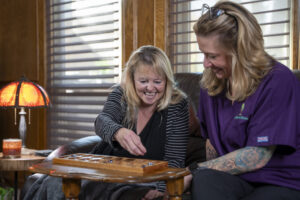
Did you know 10,000 baby boomers a day will turn 65 between now and 2030, according to Senior Service Business? That means by 2030, there will be more than 70 million Americans, or 20% of the population, over 65. So, there is much potential for senior-focused business opportunities like home health care.
Interested in starting a home health agency? View our guide on all the steps required to start a successful one and how medical vs. non-medical home health care businesses differ.
What is a Home Care Agency?
A home care agency provides services in clients’ homes or places of residence, like an independent care facility or assisted living facility. Clients are typically seniors with chronic conditions that can’t do typical house chores or drive to appointments. Families also hire caretakers to ensure their loved ones don’t fall.
Elder Options of Texas lists these as possible services of a home care business:
- Personal Care: bathing, washing hair, or getting dressed
- Homemaking: house cleaning, meal prep, yard work, and laundry
- Healthcare: home health aides, IV infusions, or dressing wounds
- Medication: reminders, administering, or monitoring refills
- Transportation: to doctors’ appointments
- Running errands: grocery shopping or picking up medications
- Companionship: card playing, taking walks, teaching seniors how to use new technology
If you’re looking at how to start a home health agency, you should know that hours vary. In-home tasks like personal care and homemaking can be daily, while transportation services, like monthly doctor’s or weekly dialysis appointments, are periodic. You could also provide 24-hour care for clients who need constant help and supervision. Unsure which services to provide? Home health care franchises like A Place At Home help you define your services. Our franchise has figured out which ones are in demand and can collect the highest revenue.
Medical vs. Non-Medical Home Health Care
Most of the services mentioned above are considered non-medical health care, but as a home health agency, you can provide medical services. The differences between the two are that non-medical care does not involve medical skills. You most likely don’t need certifications to perform these services, and you don’t have to mess with health insurance. You won’t have to go through intensive specialized education and can get started quicker.
On the reverse side, when looking into how to start a home care business, you can consider medical care like administering injections, dressing wounds, or giving IV infusions. Doctors commonly prescribe this care. Some families hire a company that provides both medical and non-medical services to help take ease the burden of caring for their loved ones.
Is This Business Profitable?
Concerned about the profit potential once you figure out how to start a home health agency? Don’t be. As mentioned above, Americans are aging, giving you a growing client base. Plus, Senior Service Business finds that 80% of seniors plan stay in their homes for as long as possible. That means more seniors and their families are turning to home health care agencies to provide necessary services.
A benefit of home health agencies is that you should have stable cash flow as long as your clients are happy. Senior Service Business says the national average for these services is $27 an hour.
With A Place at Home, we offer a variety of revenue streams to help you build a successful business. In 2021, the average gross profit of our locations that have been open for at least a year was $436,799, with franchisees reporting average sales of more than $1 million, according to our latest franchise disclosure document.
How to Start a Home Health Agency?
Here are six crucial steps to get on your way to owning a home care business:
1. Build a business plan
This will function as your blueprint for building your business. You want it to be clear and comprehensive, as it will be your roadmap to structuring, running, and growing your agency. Here you will decide between medical or non-medical services.
NOW Insurance recommends defining your market to identify your target audience. This distinction will come in handy later when you create marketing strategies to attract clients.
2. Create a budget and find funding
Set up a business bank account and create a budget to follow. While this step might seem difficult at the start because you have no revenue, you must ensure you meet overhead costs like staffing and equipment during that critical first year. Experts recommend that entrepreneurs find a loan, investor, or grant. If you’re buying into a franchise, some have in-house financing options, while others collaborate with a third-party vendor.
3. Register business
The next step in how to start a home care business is creating a business entity – a limited liability company (LLC), corporation, partnership, or sole proprietorship. Choosing one will dictate how your company is structured and taxed. You’ll register with the Secretary of State and your local government. Lastly, register for an EIN or federal tax identification number through the IRS.
4. Acquire necessary licenses, certifications, and insurance
Check state and federal departments’ guidelines on what licenses and certifications you need to operate as a home health agency. Timeero, a business management software company, finds that some states require agencies to undergo training for Medicare and Medicaid. Those training courses can be as short as under three months or as long as a year or more.It’s essential to remember that you’re working with vulnerable individuals. No matter how many precautions you take, accidents and unpredictable events happen. Check into professional liability, general liability, and possibly cybersecurity insurance. These will protect you and your employees.
5. Sell and market
ave a sales and marketing plan in place to start lining up clients. This plan should include building an online presence like setting up a Google business profile, getting your agency on prominent elder care websites’ listings, running online ads, and engaging in social media.
6. Create policies and procedures
Policies and procedures include new client onboarding, care plans, appointment scheduling, hiring, employee and payroll records, training, client billing, and client rights and responsibilities. Having these systems in place is beneficial before opening your home care agency.
One significant benefit of a home health business is that you can operate out of your home. Determine how to keep track of employee hours, how to compensate staff for mileage, and what schedules they’ll work, all from your home office. Also, decide who will keep track of billing cycles and other accounting records.
Find Success with A Place At Home
Now that you know how to start a home health agency, why not make it easier on yourself by joining A Place At Home? Our home care franchise comes with multiple opportunities for revenue streams, including care coordination, finding senior living alternatives, and staffing services. Our proven process walks you through the steps above efficiently. You attend 40 hours of in-person, hands-on training. You’ll learn all the ins and outs of our procedures, operations, and marketing. If you’re ready to forge a path in the home care business, submit a franchise form today.






